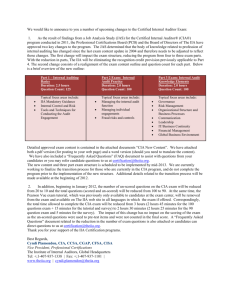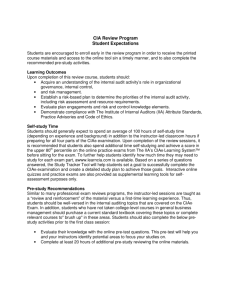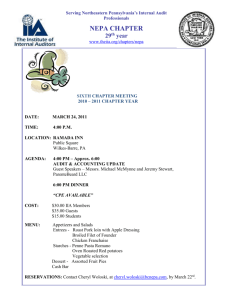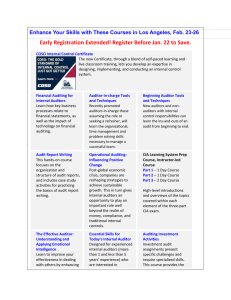June 2016 IIA Newsletter
advertisement
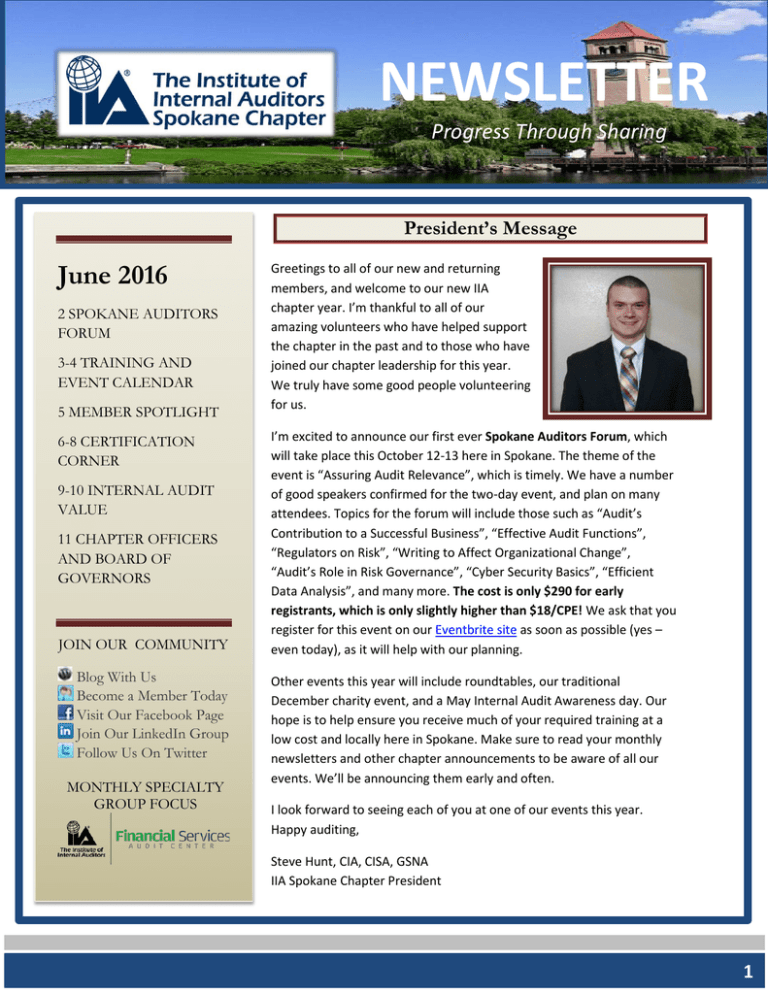
NEWSLETTER Progress Through Sharing President’s Message June 2016 2 SPOKANE AUDITORS FORUM 3-4 TRAINING AND EVENT CALENDAR 5 MEMBER SPOTLIGHT 6-8 CERTIFICATION CORNER 9-10 INTERNAL AUDIT VALUE 11 CHAPTER OFFICERS AND BOARD OF GOVERNORS JOIN OUR COMMUNITY Blog With Us Become a Member Today Visit Our Facebook Page Join Our LinkedIn Group Follow Us On Twitter MONTHLY SPECIALTY GROUP FOCUS Greetings to all of our new and returning members, and welcome to our new IIA chapter year. I’m thankful to all of our amazing volunteers who have helped support the chapter in the past and to those who have joined our chapter leadership for this year. We truly have some good people volunteering for us. I’m excited to announce our first ever Spokane Auditors Forum, which will take place this October 12-13 here in Spokane. The theme of the event is “Assuring Audit Relevance”, which is timely. We have a number of good speakers confirmed for the two-day event, and plan on many attendees. Topics for the forum will include those such as “Audit’s Contribution to a Successful Business”, “Effective Audit Functions”, “Regulators on Risk”, “Writing to Affect Organizational Change”, “Audit’s Role in Risk Governance”, “Cyber Security Basics”, “Efficient Data Analysis”, and many more. The cost is only $290 for early registrants, which is only slightly higher than $18/CPE! We ask that you register for this event on our Eventbrite site as soon as possible (yes – even today), as it will help with our planning. Other events this year will include roundtables, our traditional December charity event, and a May Internal Audit Awareness day. Our hope is to help ensure you receive much of your required training at a low cost and locally here in Spokane. Make sure to read your monthly newsletters and other chapter announcements to be aware of all our events. We’ll be announcing them early and often. I look forward to seeing each of you at one of our events this year. Happy auditing, Steve Hunt, CIA, CISA, GSNA IIA Spokane Chapter President 1 Presented by: In partnership with: The First Annual Spokane Auditors Forum October 12-13, 2016 SPOKANE, WA - VENUE TO BE ANNOUNCED CPE Credits: 16 KEYNOTE SPEAKER: TOPIC: Jack Heath President and COO, Washington Trust Bank Assuring Audit Relevance PRICE: $290 per person before August 30, 2016. After August 30, 2016, $390 per person Full time college student $25 (limit 10) Click to Register OTHER SPEAKERS: Jeff Sacks Partner, Crowe Horwath Jack Jones Author and Risk Expert, RiskLens Viney Chadha Author and Risk Expert PANEL DISCUSSIONS: Sponsored by: ACL, Crowe Horwath LLP, Price Waterhouse Cooper and Moss Adams LLP. Spokane Business Leaders Chief Audit Executives Training and Event Calendar *Topics and dates are subject to change 2016 – 2017 Chapter Year AUGUST SEPTEMBER 12-July-2016 Membersonly Webinar: Maximizing the Value of the “Three Lines of Defense” 16-August-2016 Members-only Webinar: Data Analytics – Maximizing Value for Internal Audit 20-September-2016 Members-only Webinar: Technology Champions: Key Enablers for Internal Audit July 17–20, 2016 Conference Aug. 22–24, 2016 Conference Governance, Sept. 26–27, 2016 International Conference – IIA 75th Anniversary Celebration! Risk, and Control Conference (an IIA and ISACA Collaboration JUNE JULY 21-June-2016 Members only Webinar: The Uncharted Territory of Auditing an Organization’s Culture Conference Financial Services Exchange Sept. 28-29, 2016 Conference Environmental, Health & Safety Exchange OCTOBER NOVEMBER DECEMBER 18-October-2016 Members-only Webinar: Leveraging Data to Manage Your Fraud Risk 15-November-2016 Members-only Webinar: Auditing at the Speed of Risk 15-December-2016 Toys for Tots Charity Event Oct. 17–19, 2016 Conference All Star 17-November-2016 CAE Roundtable JANUARY Conference Oct, 12-13. 2016 OnSite Spokane Auditors Forum 3 FEBRUARY MARCH APRIL MAY 16-February-2017 IT Audit Roundtable Breakfast March 20-22, 2017 Conference General April 19–20, 2017 Conference Gaming & Audit Management Conference 10-May-2017 Internal Audit Awareness Event Hospitality Conference 15-March-2017 IIA Chapter Training Key: Conferences Members Only Webinars On-Site Event—Spokane Chapter IIA Training and Event Links IIA—Spokane Chapter Website https://chapters.theiia.org/spokane/Pages/default.aspx IIA Website—Training and Events https://na.theiia.org/training/Pages/Training-andEvents.aspx 4 Member Spotlight Member: Elizabeth Lindquist Position: Compliance Manager II Company: Opportunity Bank of Montana Certifications: Certified Internal Auditor (CIA), Certified Financial Services Auditor (CFSA), Certified Community Bank Compliance Officer (CCBCO) Q: Why did you pursue Internal Audit and/or IIA Certification? I sought a career in alignment with my personality, natural tendencies, and well-rounded skill-set. This began with an honest assessment of my personality traits, which is not always the easiest task; yet, an indefinitely valuable analysis. Presently, with my soft and hard skills in sync with the demands of my career choice, I am able to accomplish remarkable goals! Q: Share one special factor of which you believe has contributed to your success. My passion, dedication, and steadfast belief in the value of Internal Auditing Q: What are some of the challenges you face in your current position? The ever-changing Regulatory Environment Q: What do you enjoy the most in your current position? High variance of tasks; I am never bored Q: Any special skills or experiences you are proud of relevant to your current position? Increased ability to assess virtually any department of a Bank, as I have purposely gained experience in multiple capacities Q: What are your passions or hobbies outside of Internal Audit/Compliance? The Great Outdoors Q: If you were not an Auditor, what would you be doing? I couldn’t; I would be lost! Q: Any word of advice to fellow Internal Auditors or those pursuing Certification? I would refer to my favorite quote below “Everyone has his superstitions. One of mine has always been when I started to go anywhere, or to do anything, never turn back or stop until the thing intended was accomplished.” –Ulysses S. Grant 5 Certification Corner Internal Auditor Magazine Earn 3 CPE credits by reading Internal Auditor (IA) magazine articles and answering questions about them here. Other CPE Opportunities Individuals can also earn CPE credits by giving presentations, writing exam questions, and more. Visit your individual CPE certification page (above) for details or see the administrative directive. There are many reasons to earn an official IIA certification designation. Whether it's the hallmark designation of internal audit — the Certified Internal Auditor® (CIA®) designation — or one of our four specialty industry certifications, obtaining a certification is professionalism defined. Earning your certification is like having a key to the vast world of opportunities the profession of internal auditing offers placed in the palm of your hand. It can open doors you did not even know existed, as the three or four letters that now follow your name will make one powerful statement about the expertise you bring to the table. The IIA’s CIA Learning System® Prepare to pass the CIA exam with the experts! The IIA’s CIA Learning System was created by a team of CIA-certified industry experts to be the most relevant, comprehensive, and effective CIA review program available. This interactive self-study program combines reading materials with online study tools to teach and reinforce the entire global CIA exam syllabus in a flexible, on-demand format. Looking for more structure, guidance and motivation? Facilitator-led courses are also available around the globe in traditional classroom, online and virtual formats. Prepare to pass the CIA exam and arm yourself with critical tools and knowledge to excel in your internal audit career. Get started today! 6 Chapter members receive 20% off on all Gleim CIA study materials! Your Spokane IIA Chapter has partnered with Gleim to ensure your success on the CIA exam! Working together, we will provide you the necessary study tools to prepare for this difficult exam. Gleim has been preparing candidates for success with their extensive self-study course for the CIA exam for over 30 years! The Gleim Review System enables you to identify your weak areas so you know where to focus your efforts and GUARANTEES that you will pass each exam part the first time. Our goal is that you achieve success while minimizing your frustration, cost, and time. As a member of the Chapter, you are eligible for 20% off all the Gleim CIA Review materials, as well as Gleim CPE. To take advantage of the reduced prices and to place your order, log into the Members Only section of the Chapter website. Please contact Steve Hunt, Chapter President, at steveh@stcu.org with questions on the discount. Visit gleim.com/cia for more information on the CIA Exam or how Gleim can help you pass. All components of the Gleim Premium CIA Review System are available any time and wherever you have access to the Internet. Get access to the first study unit of the review system absolutely free now! April, 2016 “I used the Gleim Review System for Part 3 of the CIA exam. Part 3 appeared to be the most difficult part due to the amount of content covered. The Gleim Review System included a large amount of practice questions and also provided detailed explanations for each correct and incorrect question answered. I would definitely recommend the Gleim Review System for anyone pursuing CIA certification”. G LEIM CIA Review Systems Premium CIA Review Traditional CIA Review Book and Test Prep Set CIA Supplement A. Bailey, CIA 7 Six Steps to Certification 1. Decide Which Certification is Right for You The IIA's Certified Internal Auditor® (CIA®) certification is the only globally accepted designation for internal auditors. It is a threepart exam that remains the standard by which individuals demonstrate their comprehensive competence and professionalism in the internal auditing field. The IIA also offers four specialty certifications: Certification in Control SelfAssessment® (CCSA®) Certified Government Auditing Professional® (CGAP®) Certified Financial Services Auditor® (CFSA®) Certification in Risk Management Assurance® (CRMA®) Individuals who do not meet the CIA program education and experience eligibility requirements may wish to take one of the specialty certifications, which are one-part exams. 2. Determine Your Eligibility and Skill Level Each of The IIA certification programs has unique and specific education eligibility requirements that a candidate must meet to take the exam. In addition, you may want to assess your skill level by taking a practice test using the sample questions on the website. Although your score on a practice test will not necessarily indicate what your score would be on a certification exam, a practice test may assess your readiness and lets you know in what areas you need improvement. 3. Register for the Exam The IIA's certification exams are now offered year-round through computer-based testing at more than 500 locations worldwide. Apply and Register Online 4. Prepare for the Exam You determine the method(s) in which you need to prepare for the exam. A variety of independent third-party providers offer exam review courses. In addition, consider joining one of the exam-related social media groups to connect with others preparing for the exam. Each exam has its own LinkedIn group and there is a Facebook page dedicated to preparing for the CIA exam: CIA Facebook CIA LinkedIn CCSA LinkedIn CRMA LinkedIn CGAP LinkedIn CFSA LinkedIn 5. Take the Exam With the transition to computer-based testing, The IIA's certification exams are administered through the worldwide network of Pearson VUE Testing Centers. The Pearson VUE network enables candidates to take exams at over 500 sites. The Certification Candidate Handbook provides more information on the testing experience. 6. Receive Your Certificate Once you pass the exam and meet all other program requirements, you will be eligible to receive your certificate. To order your certificate, you must log into your candidate record in CCMS and complete the certificate order form. The certificate will be shipped directly to you using a standard postal service method at no charge. Expedited shipping is also available at an additional cost. 8 Internal Audit Value Why You Should Think Like an Auditor By: Brett Scwantes, Senior Manager Wipfli CPAs and Consultants One of the most common questions asked in everyday conversations is, “What do you do for a living?” I respond with, “I am an auditor,” which typically elicits a verbal or nonverbal “Ugh!” Maybe auditing isn’t for everyone, but auditors have a unique perspective that can benefit any manager. We tend to ask a lot of questions from an independent point of view to gain an understanding of an organization’s operations. While it may seem we dwell on the negatives and the “what could go wrongs,” we are usually following a process that helps us challenge the status quo to see whether something’s been missed or whether there might be a better way. Here are some of the ways an auditor thinks that could help you better manage your organization (and maybe even your life). Are You Thinking About Risk? As auditors, we are constantly thinking about risks and how risks are managed. An organization must manage a variety of risks if it is to be successful for the long term. Think about all the different risks an organization might encounter. For example: Fraud. Auditors are often associated with fraud risk and trying to find fraud. As you may know, most fraud is not discovered by auditors, but rather by employees and/or internal controls that are working properly. It is very important for managers to take to time to consider where fraud is most likely to occur and how it can best be detected or, better yet, prevented.. Information Systems. Many different types of risk are directly related to information systems, including cybersecurity, business continuity, and even reputation. Because of the significance and complexity of information systems for most organizations, it is important that expert specialists are continually evaluating and monitoring vital systems. Human Capital. People are truly the most important asset of almost every organization. So do you consider how a higher-than-average turnover rate might impact the organization? Do you think about the effect should a key employee leave? What would happen if people were not properly trained? Disruption. Disruption could refer to a number of events such as a short-term shutdown of a factory for a few hours, a longer-term shutdown resulting from a natural disaster, or even an industrychanging event. Taxi cab drivers around the world are still coping with the disruptive event that is Uber. Although it can be difficult to contemplate all the various possible disruptive events, it is still important to consider and manage these risks. These are but a few of the risks organizations may encounter on any given day. Thoughtful planning and ongoing evaluation and monitoring are keys to managing risk to minimize any potential negative impact. 9 Are You Thinking About the Big Picture? Another skill many auditors develop is the ability to think critically. Yes, we are famous for looking at the details, but it doesn’t begin or end there. Before we dive in to look at the trees, we usually step back to consider the forest. What do we expect to see when we start looking at the details? Does it make sense based on other information we know? If we find something unexpected, we might ask questions to help us create expectations of what we will ultimately see “in the trees.” We also understand not all details are equally important. We must process the information we encounter and decide what can have the most significant impact and thus requires the most attention. As we look at the details, we may discover something about an unrelated area that we either use when looking at that area or share with others who can use that information. When we are “done,” we are not really done. One more look at the big picture is typically in order. Did the information we looked atconfirm our initial expectations? If not, is it important? Do we know why, and does it make sense? Finally, do we need to let others know what our findings are? Critical thinking is not easy, but it is necessary to successfully manage almost any organization. Do You Challenge Your Thinking? Ronald Reagan famously made the Russian proverb, “Trust, but verify,” his motto when discussing U.S. relations with the Soviet Union. Auditors refer to this as professional skepticism. It helps us avoid the trap of thinking that if nothing bad has happened in the past, it shouldn’t happen in the future. As financial planners are quick to remind us, past performance does not guarantee future results. Change is an ongoing part of an organization’s operations, which brings with it the real possibility that something we thought to be accurate is no longer so. For example, an information system update causes a report to no longer produce accurate information. Employee turnover results in a control no longer operating because information was lost in the transition. A life change causes an employee to consider exploiting a control weakness for the first time. This does not mean we need to question every report we see or distrust every person with whom we interact. But we should be prepared to verify information that doesn’t quite make sense rather than accept it simply because it came from a trustworthy source. It means we should periodically test controls, processes, and/or systems to see whether they are operating as intended, especially when we know a significant change has occurred. We should not believe something must be true because it was true yesterday. “Trust, but verify” can be a valuable motto to live by to make sure we are not assuming when we should be thinking. Thinking Like an Auditor You might have laughed when you first saw this article’s title, wondering why you would ever want to get into the head of an auditor. But I believe there are a number of skills auditors regularly use that can improve the odds of success within an organization. Managing risk, critical thinking, and using professional skepticism are just a few of the skills we regularly use to help our clients succeed in their efforts. None of these skills can be developed without some time and effort, but all of them will help you and your organization thrive for years to come! 10 IIA Spokane Chapter Officers Spokane IIA Chapter Officers elected for the 2016-2017 Chapter Year: Please join us in welcoming the new Spokane Chapter 2016-2017 Officers and Board Members! Title Chapter President President-Elect VP Communications VP Membership VP Programs Treasurer Secretary Officer Stephen Hunt Lisa Sanborn Elizabeth Lindquist Vanessa Scarpelli Marcus Garbarino Jason Seier OPEN Organization STCU Opportunity Bank of Montana Horizon Credit Union Avista Global Credit Union IIA Spokane Chapter Board of Governors Spokane IIA Chapter Board of Governors for the 2016-2017 Chapter Year: Governor Melanie Shanks Penny Brown Colleen Warner Terra Kile Kortney Todd Heather Lopez Organization STCU Banner Bank Global Credit Union DM-T WSU For those not continuing with the Chapter, please accept our sincerest appreciation for your contributions during the past year. The Chapter recognizes all of the time and energy contributed during the past year and wishes you all the best! CLICK HERE to opt-out of future communications from the IIA Spokane Chapter. 11
